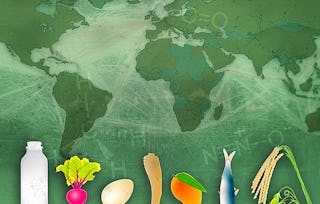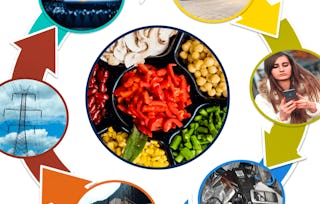This course focuses on healthy and sustainable foods. After reviewing the crucial role of food for both health and the environment, we first look at the carbon footprint and environmental impacts of multiple ingredients and more complex foods. We also detail a health-based approach to quantify the impact of 5000+ individual foods on health, expressed in minutes of life lost and gain per serving. We then analyze trade-offs and targeted changes that can bring substantial health and environmental benefits with less than 10% caloric change. We finally address the health and sustainable performances of various diets, looking at disparities between gender, races and diets.

Healthy and Sustainable Foods
3 days left! Gain next-level skills with Coursera Plus for $199 (regularly $399). Save now.

Healthy and Sustainable Foods
This course is part of Healthy and Sustainable Foods and Products Specialization

Instructor: Olivier Jolliet
3,711 already enrolled
Included with
(25 reviews)
What you'll learn
Assess nutritional performance and sustainability of foods
Analyze trade-offs between health and environmental impact of foods
Apply these concepts to 5,800 individual food items and diets
Skills you'll gain
Details to know

Add to your LinkedIn profile
18 assignments
See how employees at top companies are mastering in-demand skills

Build your subject-matter expertise
- Learn new concepts from industry experts
- Gain a foundational understanding of a subject or tool
- Develop job-relevant skills with hands-on projects
- Earn a shareable career certificate

There are 3 modules in this course
Welcome! This module will introduce you to our course. The introductory lesson will provide an overview of the topics we will explore and outline the expectations and procedures. You will be introduced to utilizing spreadsheets as a tool for evaluating different types of foods. The module will conclude by introducing methods that can be used to measure the environmental impact of various food choices.
What's included
10 videos8 readings6 assignments1 app item1 discussion prompt
This module focuses on evaluating the nutritional impact of food on individuals' health and how a combination of multiple evaluations can help us make changes to our diet that will result in positive impacts. You will be introduced to Dietary Risk Factors (DRF) and the Health Nutritional Index (HENI) as usable measurements. We will then move on to discuss the various trade-offs that one should consider when prioritizing a given measurement to inform their food choices. We conclude this module by thinking through how to make targeted changes to our diet to result in better nutritional and environmental outcomes.
What's included
9 videos7 readings8 assignments1 discussion prompt
This final module examines the dietary impacts of multiple foods to then analyze trade-offs and targeted changes that can bring substantial health and environmental benefits with less than 10% caloric change. Then, you will utilize the calculations skills you've practiced to complete the End-of-Course Assessment. This assessment will be similar to the previous end-of-week quizzes, but it will instead cover concepts from the entire course rather than just one week. Lastly, we ask you to reflect on how your meal choices have changed since you began the course. If you elect to do so, you will revisit our initial meal sharing Gallery exercise to share your most recent meal as you complete our course!
What's included
10 videos5 readings4 assignments1 app item2 discussion prompts
Earn a career certificate
Add this credential to your LinkedIn profile, resume, or CV. Share it on social media and in your performance review.
Instructor

Offered by
Explore more from Public Health
 Status: Preview
Status: PreviewJohns Hopkins University
 Status: Free Trial
Status: Free TrialUniversity of Michigan
 Status: Free Trial
Status: Free TrialStanford University
 Status: Free Trial
Status: Free TrialUniversity of Michigan
Why people choose Coursera for their career

Felipe M.

Jennifer J.

Larry W.

Chaitanya A.
Learner reviews
- 5 stars
80%
- 4 stars
8%
- 3 stars
0%
- 2 stars
4%
- 1 star
8%
Showing 3 of 25
Reviewed on Sep 29, 2024
Exceptional inputs in to healthy and sustainable foods. We need to get geared to eat healthy and sustainably
Frequently asked questions
To access the course materials, assignments and to earn a Certificate, you will need to purchase the Certificate experience when you enroll in a course. You can try a Free Trial instead, or apply for Financial Aid. The course may offer 'Full Course, No Certificate' instead. This option lets you see all course materials, submit required assessments, and get a final grade. This also means that you will not be able to purchase a Certificate experience.
When you enroll in the course, you get access to all of the courses in the Specialization, and you earn a certificate when you complete the work. Your electronic Certificate will be added to your Accomplishments page - from there, you can print your Certificate or add it to your LinkedIn profile.
Yes. In select learning programs, you can apply for financial aid or a scholarship if you can’t afford the enrollment fee. If fin aid or scholarship is available for your learning program selection, you’ll find a link to apply on the description page.
More questions
Financial aid available,





